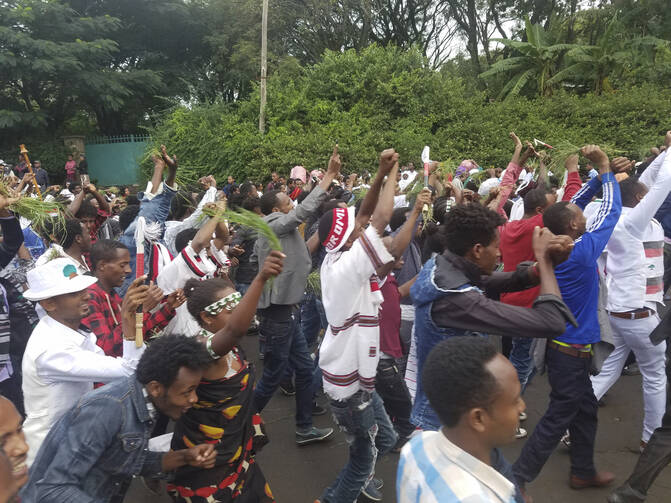Witnesses said violent unrest continued Monday in Ethiopia, a day after 52 people were crushed to death during an anti-government protest at a massive religious festival. One witness said bodies were still being pulled from ditches where people fell while trying to flee in a stampede from tear gas and bullets.
Clashes between security forces and protesters erupted Sunday evening and continued through Monday morning in the towns of Bishoftu and Ambo in the restive Oromia region, an Ethiopian government official and witnesses told The Associated Press.
"Some people tried to come out en masse this morning to protest the deaths of holiday-goers on Sunday and also demand the release of people arrested during the celebrations," said Nimona Negash, a tuk-tuk driver in Bishoftu, where Sunday's disaster occurred. "Today's protesters were peaceful but dispersed by police violently. I'm not aware of any deaths this morning, but it was violent. But I'm aware of live bullets used this morning in other vicinities of this town."
He said family members of people who died in Sunday's stampede and others looking for their loved ones were flocking to Bishoftu, creating tension there. He said he heard some 200 people had been arrested.
"I went to the place where the accident happened this morning, and I've seen people being pulled out," Nimona said. "More and more people are coming out of a deep ditch. I saw seven bodies being pulled out then left the scene as I was unable to watch more."
Sunday's stampede occurred as people ran to escape police firing tear gas and rubber bullets and shooting live rounds into the air after anti-government protesters approached the stage where religious leaders were speaking. Huge crowds were celebrating the annual Irrecha thanksgiving celebration in the town 45 kilometers (27 miles) southeast of the capital, Addis Ababa.
The Oromia region has been experiencing violent, sometimes deadly anti-government protests since November 2015 as people call for wider political freedoms and the release of detained opposition figures and journalists.
Ethiopia's government, a close security ally of the West, has been accused often of silencing dissent, at times blocking internet access. The U.S. recently spoke out against what it called the excessive use of force against protesters, calling the country's situation "extremely serious."
The head of the Oromia region's spokesman's office, Fikadu Tessema, told the AP on Monday that some groups were trying to "continue the violence that they orchestrated on Sunday."
He said they were trying to portray the stampede as caused by live bullets fired by government forces.
"I can assure you 100 percent that all the 52 victims died of a stampede and didn't have bullet wounds on their bodies," he said. "The current situation in Oromia is not out of control. We are taking measures to bring back our peace."
Copyright 2016 The Associated Press. All rights reserved. This material may not be published, broadcast, rewritten or redistributed.








